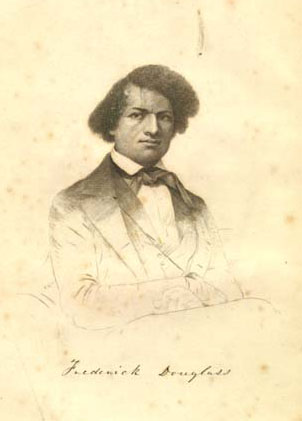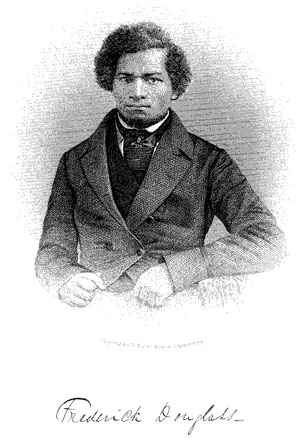Excerpt from Chapter XXIII ofMy Bondage and My Freedom
In the summer of 1841, a grand anti-slavery convention was held in Nantucket, under the auspices of Mr. Garrison and his friends.
Until now, I had taken no holiday
since my escape from slavery.
Having worked very hard that spring and summer, in Richmond's brass foundery--sometimes working all night as well as all day--and
needing a day or two of rest, I attended this convention, never supposing that I should take part in the proceedings.
Indeed, I was not aware that any one connected with
the convention even so much as knew my name. I was, however, quite mistaken. Mr. William C. Coffin,
a prominent abolitionist in those days of trial, had heard me speaking
to my colored friends, in the little school-house on Second street, New Bedford, where we worshipped.
He sought me out in the crowd, and invited me to say a few words to
the convention. Thus sought out, and thus invited, I was induced to speak out the feelings inspired by the occasion, and the fresh recollection of the scenes through which
I had passed as a slave. My speech on this occasion is about the only one I ever made, of which I do not remember a single connected sentence. It was with the utmost
difficulty that I could stand erect, or that I could command and articulate two words without hesitation and stammering. I trembled in every limb. I am not sure that my
embarrassment was not the most effective part of my speech, if speech it could be called. At any rate, this is about the only part of my performance that I now distinctively
remember. But excited and convulsed as I was, the audience, though remarkably quiet before, became as much excited as myself.
[William Lloyd]
Mr. Garrison
followed me, taking me
as his text; and now, whether I had made an eloquent speech in behalf of freedom or not, his was one never to be forgotten by those who heard it. Those who had heard
Mr. Garrison oftenest, and had known him longest, were astonished. It was an effort of unequaled power, sweeping down, like a very tornado, every opposing barrier,
whether of sentiment or opinion. For a moment, he possessed that almost fabulous inspiration, often referred to but seldom attained, in which a public meeting is transformed,
as it were, into a single individuality--the orator wielding a thousand heads and hearts at once, and by the simple majesty of his all controlling thought, converting his hearers
into the express image of his own soul. That night there were at least one thousand Garrisonians in Nantucket! At the close of this great meeting, I was duly waited on by Mr.
John A. Collins-then the general agent of the Massachusetts anti-slavery society--and urgently solicited by him to become an agent of that society, and to publicly advocate
its anti-slavery principles. I was reluctant to take the proffered position.
I had not been quite three years from slavery-was honestly distrustful of my ability--wished to be
excused; publicity exposed me to discovery and arrest by my master; and other
objections came up, but Mr. Collins was not to be put off, and I finally consented to go
out for three months, for I supposed that I should have got to the end of my story and my usefulness, in that length of time.
Here opened me a new life-a life for which I had no preparation. I was a "graduate from the peculiar institution."
Mr. Collins used to say, when introducing me, "with my
diploma written on my back!" The three years of my freedom had been spent
in the hard school of adversity. My hands had been furnished by nature with something
like a solid leather coating, and I had bravely marked out for myself a life of
rough labor, suited to the hardness of my hands, as a means of supporting myself and rearing my children.
Now what shall I say of this fourteen years' experience as a public advocate of the cause of my enslaved brothers and sisters? The time is but as a speck, yet large enough
to justify a pause for retrospection--and a pause it must only be.
Young, ardent, and hopeful, I entered upon this new life in the full gush of unsuspecting enthusiasm. The cause was good, the men engaged in it were good; the means to attain
its triumph, good; Heaven's blessing must attend all, and freedom must soon be given to the pining millions under a ruthless bondage. My whole heart went with the holy cause,
and my most fervent prayer to the Almighty Disposer of the hearts of men, were continually offered for its early triumph. "Who or what," thought I, "can withstand a cause so good,
so holy, so indescribably glorious. The God of Israel is with us. The might of the Eternal is on our side. Now let but the truth be spoken, and a nation will start forth at the sound!"
I this enthusiastic spirit, I dropped into the ranks of freedom's friends, and went forth to the battle. For a time I was made to forget that my skin was dark and my hair crisped. For a
time I regretted that I could not have shared the hardships and dangers endured by the earlier workers for the slave's release. I soon, however, found that my enthusiasm had
been extravagant; that hardships and dangers were not yet passed; and that the life now before me, had shadows as well as sunbeams.
Among the first duties assigned me, on entering the ranks, was to travel, in company with Mr. George Foster, to secure subscribers to the "Anti-slavery Standard" and the "Liberator."
With him I traveled and lectured through the eastern counties of Massachusetts.
Much interest was awakened-large meetings assembled. Many came, no doubt, from curiosity to
hear what a negro could say in his own cause. I was generally introduced as a "chattel"-a "thing--a piece of southern "property---
the chairman assuring the
audience that it could speak. Fugitive slaves, at that time, were not so plentiful as now; and as a fugitive slave lecturer, I had the advantage of being a "brand new fact"--the
first one out. Up to that time, a colored man was deemed a fool who confessed himself a runaway slave, not only because of the danger to which he exposed himself of being retaken,
but because it was a confession of a very low origin! Some of my colored friends in New Bedford thought very badly of my wisdom for thus exposing and degrading myself.
The only precaution I took, at the beginning, to prevent Master Thomas from knowing where I was, and what I was about, was the withholding my former name, my master's name,
and the name of the state and country from which I came. During the first three or four months, my speeches were almost exclusively made up of narrations of my own personal
experience as a slave. "Let us have the facts," said the people. So also said Friend George Foster, who always wished to pin me down to my simple narrative. "Give us the facts,"
said Collins, "we will take care of the philosophy." Just here arose some embarrassment. It was impossible for me to repeat the same old story month after month, and
to keep up my interest in it. It was new to the people, it is true, but it was an old story to me; and to go through with it night after night, was a task altogether too mechanical for my nature.
"Tell your story, Frederick," would whisper my then revered friend, William Lloyd Garrison, as I stepped upon the platform. I could not always obey, for I was now reading and thinking.
New views of the subject were presented to my mind. It did not entirely satisfy me to narrate wrongs; I felt like denouncing them. I could not always curb my moral
indignation for the perpetrators of slaveholding villainy, long enough for a circumstantial statement of the facts which I felt almost everybody must know. Besides, I was growing,
and needed room. "People won't believe you ever was a slave, Frederick, if you keep up this way," said Friend Foster. "Be yourself," said Collins, "and tell your story." It was said
to me, "Better have a little of the plantation manner of speech than not; 'tis not best that you seem too learned." These excellent friends were actuated by the best of motives,
and were not altogether wrong in their advice; and still I must speak just the word that seemed to me the word to be spoken by me.
From
My Bondage and My Freedom. "Chapter XXIII: Introduced to the Abolitionists." 1855. New York: Library of Amercia, 1994: 364-367.
|


